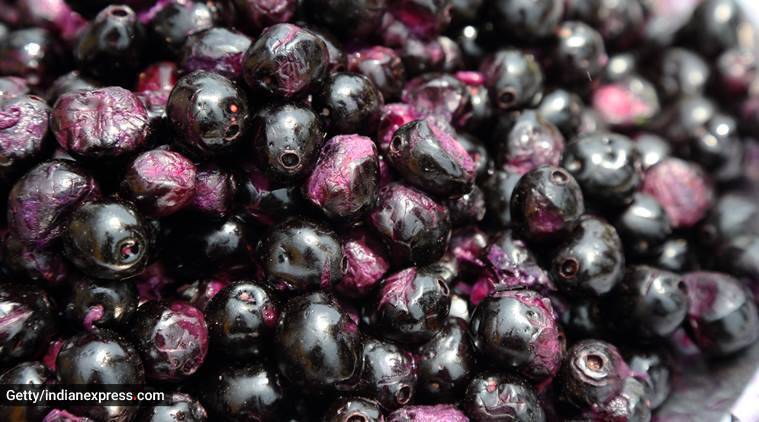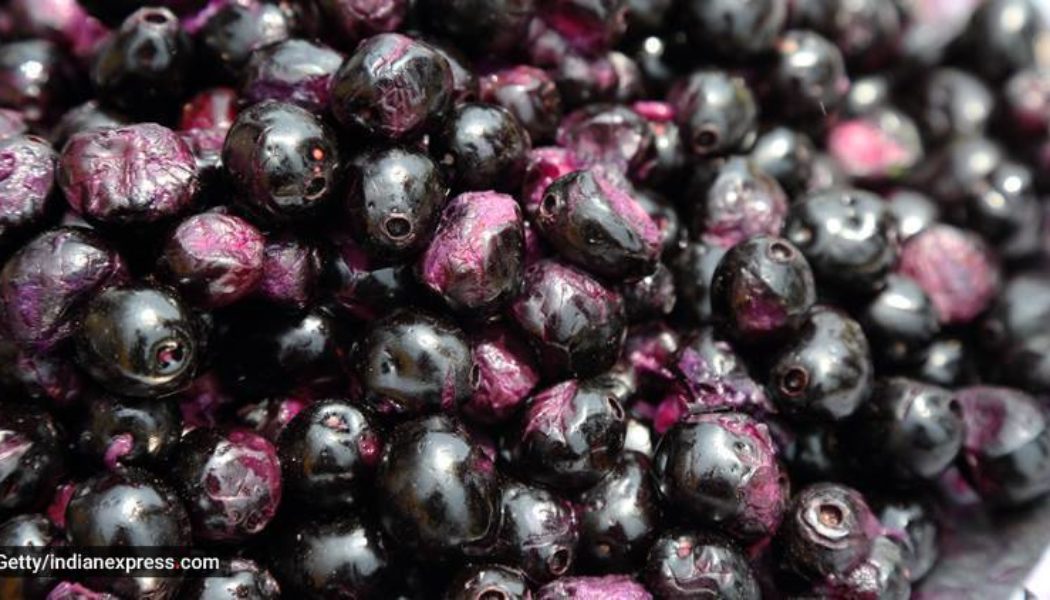Jamun, also known as Malabar plum or Java plum, is a small fruit that is dark purple in colour and has a tangy-sweet taste. Rich in nutrients and numerous health benefits, this fruit also boasts a low glycemic index, which means it does not cause a rapid increase in blood sugar levels, making it a safe option for diabetes patients. It, in fact, also helps alleviates diabetic symptoms such as “excessive urination” according to the journal Astounding Health Benefits of Jamun (Syzygium cumini) toward Metabolic Syndrome published in the National Center for Biotechnology Information. The same journal also stated the “anti-obesity and anti-hypertensive effect” of jamun.
Additionally, jamuns are a good source of fiber, vitamin C, iron, calcium, and antioxidants, which help protect the body from oxidative stress and may even reduce the risk of chronic diseases such as cancer and heart disease.
Nutritional profile of jamuns
Speaking with indianexpress.com, Guru Prasad Das, Senior Dietitian, CARE Hospitals, Bhubaneswar shared, “Jamuns are a delicious and nutritious fruit that can be enjoyed as part of a balanced diet”. Below is jamuns nutritional profile, as shared by the expert:
One cup of jamuns (135 grams) contains approximately:
– Calories: 60
– Carbohydrates: 14 grams
– Protein: 1.4 grams
– Fat: 0.3 grams
– Fiber: 1.4 grams
– Vitamin C: 14% of the Daily Value (DV)
– Iron: 1% of the DV
– Calcium: 1% of the DV
Health benefits of jamuns
1. Low in calories: Jamuns are a low-calorie fruit, with one cup of raw fruit containing only about 60 calories, making them a good option for those trying to manage their weight.
2. Rich in antioxidants: Jamuns are a good source of antioxidants, which help protect the body against damage caused by harmful molecules called free radicals. This may reduce the risk of chronic diseases such as cancer, heart disease, and diabetes.
3. May help manage diabetes: Jamuns contain compounds that may help regulate blood sugar levels by increasing insulin secretion and improving insulin sensitivity. This may be helpful for people with diabetes.
Advertisement
4. May improve digestion: The fiber content in jamuns can help improve digestion and prevent constipation.
5. May boost immunity: Jamuns contain vitamin C, which is essential for a healthy immune system. Eating jamuns may help boost immunity and reduce the risk of infections.
6. May improve heart health: The antioxidants in jamuns may help reduce inflammation and improve heart health by reducing the risk of heart disease.
Advertisement
 Jamuns are a good source of fiber, vitamin C, iron, and calcium. (Getty/Thinkstock)
Jamuns are a good source of fiber, vitamin C, iron, and calcium. (Getty/Thinkstock)
How many jamuns can diabetic patients consume?
The amount of jamuns diabetic patients can consume depends on their individual health status and blood sugar control. “Jamuns are a low glycemic index fruit, meaning they do not cause a rapid spike in blood sugar levels when consumed in moderate amounts. They also contain fiber, which can help slow down the absorption of carbohydrates and prevent blood sugar spikes,” added Das.
He, however, mentioned that diabetic patients consult with their healthcare provider or a registered dietitian to determine the appropriate serving size for their individual needs.
Things to keep in mind
Here are some things to keep in mind when consuming jamuns, as shared by Das. They are:
1. Portion size: While jamuns are a nutritious fruit, it is important to consume them in moderation, especially if you have diabetes or are trying to manage your weight. A typical serving size is about 1 cup or approximately 100 grams.
2. Total carbohydrate intake: Jamuns, like all fruits, contain carbohydrates, which can affect blood sugar levels. It is important to consider the total carbohydrate content of your meals and snacks, and to balance your intake of carbohydrate-containing foods with other nutrient-dense foods such as vegetables, protein, and healthy fats.
Advertisement
3. Dietary restrictions: If you have any dietary restrictions or food allergies, be sure to check with your healthcare provider or a registered dietitian to determine if jamuns are safe for you to consume.
4. Seasonal availability: Jamuns are a seasonal fruit that are typically available during the summer months. If you are unable to find fresh jamuns, you may be able to find frozen or canned varieties, but be sure to check the labels for added sugars or other unwanted additives.
Advertisement
5. Food safety: As with any fruit, it is important to wash jamuns thoroughly before consuming them to remove any dirt, bacteria, or pesticides.
📣 For more lifestyle news, follow us on Instagram | Twitter | Facebook and don’t miss out on the latest updates!








